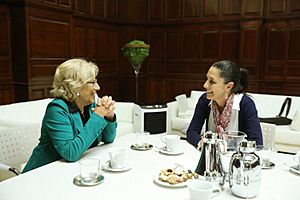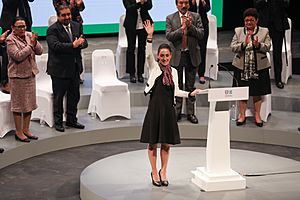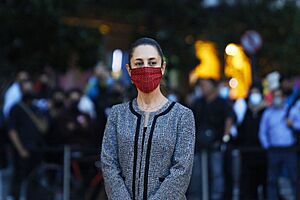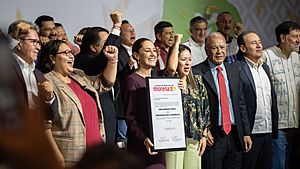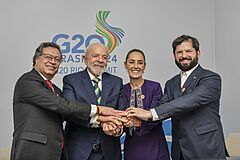Claudia Sheinbaum facts for kids
Quick facts for kids
Claudia Sheinbaum
|
|
|---|---|
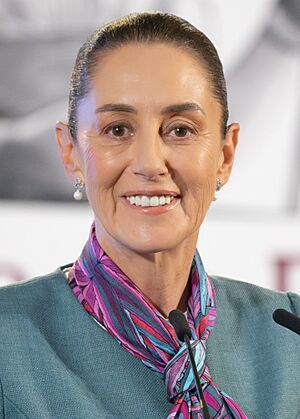
Sheinbaum in 2024
|
|
| 66th President of Mexico | |
| Assumed office 1 October 2024 |
|
| Preceded by | Andrés Manuel López Obrador |
| Head of Government of Mexico City | |
| In office 5 December 2018 – 16 June 2023 |
|
| Preceded by | José Ramón Amieva |
| Succeeded by | Martí Batres |
| Mayor of Tlalpan | |
| In office 1 October 2015 – 6 December 2017 |
|
| Preceded by | Héctor Hugo Hernández Rodríguez |
| Succeeded by | Fernando Hernández Palacios |
| Secretary of the Environment of the Federal District | |
| In office 5 December 2000 – 15 May 2006 |
|
| Head of Government |
|
| Preceded by | Alejandro Encinas Rodríguez |
| Succeeded by | Eduardo Vega López |
| Personal details | |
| Born |
Claudia Sheinbaum Pardo
24 June 1962 Mexico City, Mexico |
| Political party | Morena (since 2014) |
| Other political affiliations |
Party of the Democratic Revolution (1989–2014) |
| Spouses |
|
| Children | 2 |
| Parents |
|
| Residence | National Palace |
| Education | National Autonomous University of Mexico (BS, MS, PhD) |
| Signature |  |
| Scientific career | |
| Fields | Energy conservation, energy policy, sustainable development |
| Institutions | National Autonomous University of Mexico |
Claudia Sheinbaum Pardo (born June 24, 1962) is a Mexican politician and scientist. She became the 66th president of Mexico in 2024. She is the first woman to ever hold this office. She is a member of the Morena political party.
Before becoming president, Sheinbaum was the Head of Government of Mexico City from 2018 to 2023. This job is like being the city's mayor. In 2024, Forbes magazine named her the fourth most powerful woman in the world.
Sheinbaum is also a scientist. She has a Ph.D. in energy engineering. She has written over 100 articles and two books about energy and the environment. She was part of the Intergovernmental Panel on Climate Change, a group that studies climate change.
Her political career began in 2000. She served as the Secretary of the Environment for Mexico City. In 2015, she was elected mayor of the Tlalpan borough in Mexico City. She won the 2024 presidential election by a large margin.
Contents
Early Life and Education
Claudia Sheinbaum Pardo was born in Mexico City on June 24, 1962. Her family is Mexican Jewish. Her father, Carlos Sheinbaum Yoselevitz, was a chemist. Her mother, Annie Pardo Cemo, was a biologist. Her grandparents came to Mexico from Lithuania and Bulgaria.
Sheinbaum's parents were involved in politics and social movements. This inspired her interest in making a difference in her community.
Sheinbaum studied at the National Autonomous University of Mexico (UNAM). She earned a degree in physics, a master's degree, and a Ph.D. in energy engineering. As part of her studies, she researched energy use in Mexico's transportation system at a lab in California.
Early Political Career
While she was a student, Sheinbaum joined a student group that later helped form the Party of the Democratic Revolution (PRD).
From 2000 to 2006, she was the Secretary of the Environment for Mexico City. She worked for Andrés Manuel López Obrador, who was the Head of Government at the time. During her term, she helped create the Metrobús, a bus system with its own special lanes.
In 2014, she joined the Morena party, a new political movement started by López Obrador.
Mayor of Tlalpan
In 2015, Sheinbaum was elected mayor of Tlalpan, a borough in Mexico City. She focused on improving public services and creating programs for women and young people.
During her time as mayor, two major events happened. In 2016, a chapel was partly demolished by city workers by mistake. Sheinbaum met with church leaders and agreed to build a new chapel.
In 2017, the Colegio Enrique Rébsamen, a private school, collapsed during the 2017 Puebla earthquake. This tragic event killed 19 children and seven adults. Sheinbaum faced questions about the school's building permits and safety.
She left her position as mayor in 2017 to run for Head of Government of Mexico City.
Head of Government of Mexico City (2018–2023)
On July 1, 2018, Sheinbaum was elected Head of Government of Mexico City. She was the first woman elected to this position. She worked closely with President Andrés Manuel López Obrador.
She resigned on June 16, 2023, to run for president of Mexico.
Key Policies and Projects
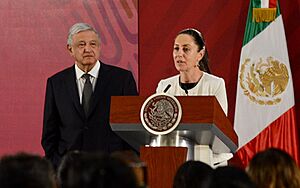
Sheinbaum's government focused on several key areas:
- Crime and Safety: She worked to improve policing and address the causes of crime. Her government also created "safe corridors" to improve safety for women in public spaces.
- Education: She started a scholarship program for students from preschool to high school. Her government also opened two new universities.
- Environment: In 2019, she launched a plan to reduce air pollution, plant millions of trees, and ban single-use plastics.
- Public Transportation: She introduced the Cablebús, a cable car system, to connect different parts of the city. She also expanded the Metrobús network and began a major update of Metro Line 1.
Crisis Management
COVID-19 Pandemic
When the COVID-19 pandemic began in 2020, Sheinbaum's government took action. She encouraged people to stay home and wear face masks to slow the spread of the virus. Her handling of the pandemic earned her a nomination for the World Mayor Prize in 2021.
Metro Line 12 Collapse
On May 3, 2021, a section of the elevated track on Metro Line 12 collapsed. The accident resulted in 26 deaths and many injuries. The line had been built before her time in office.
An investigation found that there were problems with the structure before the collapse. Sheinbaum's government was responsible for the Metro's maintenance. The event led to public discussion about her leadership.
2024 Presidential Campaign
In June 2023, Sheinbaum stepped down as Head of Government to seek the presidential nomination for her party's coalition. On September 6, she was declared the winner of her party's internal selection process.
Her campaign officially began on March 1, 2024. She promised to continue the policies of President López Obrador. She also proposed new social programs for students and older women.
On June 2, 2024, Sheinbaum won the presidential election with a large majority. She received more votes than any other candidate in Mexico's history.
Presidency (2024–present)

Sheinbaum was sworn in as president on October 1, 2024. She became the first woman and the first person of Jewish heritage to lead Mexico.
In her first months, she focused on social programs, government reforms, and security. She created a new pension for women aged 60 to 64. She also expanded scholarships for children in public schools.
Her government took a strong approach to organized crime. It also continued to invest in major infrastructure projects, like expanding Mexico's passenger train network.
Foreign Policy
Sheinbaum has stated that Mexico's foreign policy is based on non-intervention and peaceful solutions to conflicts. She supports the two-state solution for the Israeli–Palestinian conflict.
Her administration has worked closely with the United States on issues like trade and security. After Donald Trump won the 2024 U.S. presidential election, they worked together to avoid a trade dispute.
Political Views
Sheinbaum describes herself as a feminist and supports women's rights. She has also supported LGBT rights.
She is critical of neoliberal economic policies, which she believes have created inequality. She supports government programs to help people.
As a scientist, she has a strong background in environmental issues. She supports clean energy but also praises Mexico's state-owned oil company, PEMEX.
Personal Life
Sheinbaum was married to Carlos Ímaz Gispert from 1987 to 2016. They have a daughter, Mariana. Sheinbaum also raised Ímaz's son from a previous marriage.
In November 2023, she married Jesús María Tarriba Unger. He is a financial risk analyst for the Bank of Mexico.
Images for kids
-
Sheinbaum and U.S. President Joe Biden in November 2024.
See also
 In Spanish: Claudia Sheinbaum para niños
In Spanish: Claudia Sheinbaum para niños
 | Laphonza Butler |
 | Daisy Bates |
 | Elizabeth Piper Ensley |


